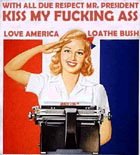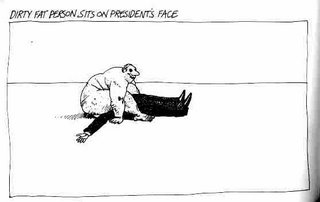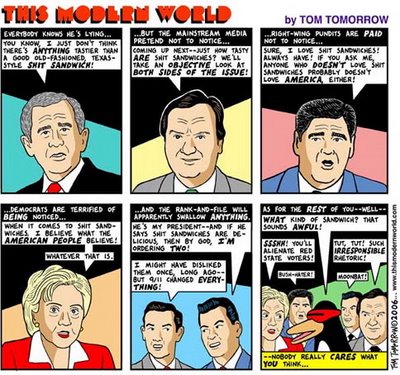
“... We're recasting the Bizarros as a frightening, unstoppable zombie-plague style menace. The Bizarros are a lot more predatory in All-Star and their touch is infectious. It's a 'zombie apocalypse' approach to the Bizarro concept and the idea of an unstoppable plague of backwards-talking idiocy sweeping across the globe seems ironically amusing right now.”
-- Grant Morrison on writing All-Star Superman
***
It's like, "Hey, ever heard of a little thing called 'resolving issues through unconscious acting-out of a maladaptive fantasy-life manifesting itself through inappropriately weak personal boundaries'?" Hello? -- “Becky OFlanahan” interview for The Onion
***
“This book augments the portrait of Mr. Bush as an incurious and curiously uninformed executive that Mr. Suskind earlier set out in "The Price of Loyalty" and in a series of magazine articles on the president and key aides. In "The One Percent Doctrine," he writes that Mr. Cheney's nickname inside the C.I.A. was Edgar (as in Edgar Bergen), casting Mr. Bush in the puppet role of Charlie McCarthy, and cites one instance after another in which the president was not fully briefed (or had failed to read the basic paperwork) about a crucial situation.”
---book review for THE ONE PERCENT DOCTRINE by Ron Suskind in The NYT 6/20/06
“During a November 2001 session with the president, Mr. Suskind recounts, a C.I.A. briefer realized that the Pentagon had not told Mr. Bush of the C.I.A.'s urgent concern that Osama bin Laden might escape from the Tora Bora area of Afghanistan (as he indeed later did) if United States reinforcements were not promptly sent in. And several months later, he says, attendees at a meeting between Mr. Bush and the Saudis discovered after the fact that an important packet laying out the Saudis' views about the Israeli-Palestinian situation had been diverted to the vice president's office and never reached the president.
Keeping information away from the president, Mr. Suskind argues, was a calculated White House strategy that gave Mr. Bush "plausible deniability" from Mr. Cheney's point of view, and that perfectly meshed with the commander in chief's own
 impatience with policy details. Suggesting that Mr. Bush deliberately did not read the full National Intelligence Estimate on Iraq, which was delivered to the White House in the fall of 2002, Mr. Suskind writes: "Keeping certain knowledge from Bush — much of it shrouded, as well, by classification — meant that the president, whose each word circles the globe, could advance various strategies by saying whatever was needed. He could essentially be 'deniable' about his own statements."
impatience with policy details. Suggesting that Mr. Bush deliberately did not read the full National Intelligence Estimate on Iraq, which was delivered to the White House in the fall of 2002, Mr. Suskind writes: "Keeping certain knowledge from Bush — much of it shrouded, as well, by classification — meant that the president, whose each word circles the globe, could advance various strategies by saying whatever was needed. He could essentially be 'deniable' about his own statements.""Whether Cheney's innovations were tailored to match Bush's inclinations, or vice versa, is almost immaterial," Mr. Suskind continues. "It was a firm fit. Under this strategic model, reading the entire N.I.E. would be problematic for Bush: it could hem in the president's rhetoric, a key weapon in the march to war. He would know too much."
***
“After all, there’s a reason they call it the mass market. It’s massive. It’s fat, it’s big, and it’s dumb as a post.”
“The Direct Market is about as hale and hearty as a beached whale, and Marvel Comics has spent the last few years muttering to itself and pushing around a shopping cart. So failing to look for new readers and new venues would be eight kinds of stupid. We gotta shop around.”
-- Frank Miller, speaking at the Harvey Kurtzman awards
***

***
• "These self-obsessed women seem genuinely unaware that 9-11 was an attack on our nation and acted like as if the terrorist attack only happened to them. They believe the entire country was required to marinate in their exquisite personal agony. Apparently, denouncing bush was part of the closure process. These broads are millionaires, lionized on TV and in articles about them, reveling in their status as celebrities and stalked by griefparrazies. I have never seen people enjoying their husband’s death so much." --Ann Coulter
• "We have been slandered. Contrary to Ms. Coulter’s statements, there was no joy in watching men that we loved burn alive. There was no happiness in telling our children that their fathers were never coming home again. We adored these men and miss them every day," -- Kristen Breitweiser, Lorie Van Auken, Mindy Kleinberg and Patty Casazza of New Jersey
***
“I got in a lot of trouble a few weeks ago for being disrespectful toward Ana Marie Cox. I have no intention of being disrespectful now. I think it's just terrific that she's become a full fledged member of the mainstream media and is covering bloggers as if they are pod people from mars. It's the smart career move. Still, it's quite a transition since for several years she represented the liberal blogosphere on countless blogging panels and media appearances. It's a testament to her faking skills that she could convincingly be a blogging pioneer one minute and a befuddled mainstream journalist the next. It's trailblazing, actually.”
-- digby on the shark-jumping Wonkette
***
“Favorite complain about contemporary world: the facetiousness of ‘respectable’ people... who, because not taking anyting seriously, are destroying old human feelings older than TIME magazine... Dave Garroways laughing at white doves.”
-- Jack Kerouac, in the introduction to “Lonesome Traveler’
***
“For there is something new in the Reign of Terror, and that is its absolutism. You couldn’t escape it. In the old regime, if you were determined to stay out of politics, politics could stay out of you. In revolutionary France, the modern development was that you could not withdraw, or go into self-exile—you could not even repent or adopt the other religion. You could only wait and hope not to die. When the Abbé Sieyès, asked what he had done during the Terror, answered, “I lived,” he was making more than a mordant joke; he was identifying the new thing that had come into the world, which was a will to killing that made merely living achievement enough.
“The bloodlust of the time makes the attempt to trace the Terror to any single intellectual source, or peculiar circumstance—to Enlightenment rationalism gone mad, or to the paranoia of the encircled Republicans—feel inadequate to the Terror’s essential nature, which was that it didn’t matter what the ideology was. The argument that a taste for the ideal and the tabula rasa leads to terror, after all, would be more convincing if its opposite—a desire for an organic, authentic, traditional society—didn’t lead to terror, too. The Red Terror led to a White Terror; Robespierre’s head had hardly fallen before the Gilded Youth were attacking the now helpless Jacobins. It sometimes seems as if history had deliberately placed Hitler and Stalin side by side at the climax of the horror of modern history simply to demonstrate that the road to Hell is paved with any intention you like; a planned, pseudo-rationalist utopianism and an organic, racial, backward-looking Romanticism ended up with the same camps and the same carnage. The historical lesson of the first Terror is not that reason devours its own but that reason cannot stop us from devouring each other.”
-- Adam Gopnik, HEADLESS HORSEMAN
The Reign of Terror Revisited The New Yorker, 6/5/06
***
"How can one wonder at any number of strange assertions from men whose whole lives were devoted to mockery, and who were ready at any time to sacrifice the reputation of their superiors to vulgar envy and spite, as to some evil genius."
-- Pericles
(quotation included in a birthday letter written to Eleanor Roosevelt by Harry Truman)
***
“You’ve got some kind of adolescent infatuation with the idea of gallantry and fair play,” she said. “He was doing what he thought was right. Damn you, why have you got me defending him? Would you leave? Please?”
-- from THE EMPTY COPPER SEA by John D. MacDonald
***
Students will contrast and compare the following excerpts from THE ONE PERCENT DOCTRINEby Ron Suskind with THE EMPTY COPPER SEA by John D. MacDonald:
I. (From Suskind): “As for Mr. Tenet, this book provides a nuanced portrait of a man with "colliding loyalties — to the president, who could have fired him after 9/11 but didn't; and to his analysts, whom he was institutionally and emotionally committed to defend." It would become an increasingly untenable position, as the White House grew more and more impatient with the C.I.A.'s reluctance to supply readily the sort of intelligence it wanted. ...While many C.I.A. analysts were deeply skeptical of the imminent danger posed by Mr. Hussein and simultaneously worried about the fallout of a possible invasion, the C.I.A., paradoxically enough, would become a favorite scapegoat for the administration's decision to go to war against Iraq, thanks in no small measure to Mr. Tenet's remark (quoted in Bob Woodward's 2004 book "Plan of Attack") that the existence of Iraqi weapons of mass destruction was a "slam dunk." ...He depicts the former C.I.A. director as frequently being made by the White House "to take the fall" for his superiors, on matters including the administration's handling of prewar intelligence to the 16 disputed words in the president's State of the Union address, regarding Iraq's supposed efforts to obtain uranium from Africa. Because it was Mr. Tenet "who brought analysis up the chain from the C.I.A.," Mr. Suskind writes, he "was best positioned to assume blame. And Rice was adept at laying it on Tenet."
At the same time, Mr. Suskind suggests that Mr. Tenet acted as a kind of White House enabler: he writes that in the wake of 9/11, Mr. Tenet felt a "mix of insecurity and gratitude" vis-à-vis George W. Bush, and that eager to please his boss, he repeatedly pushed C.I.A. staff members to come up with evidence that might support the president's public statements.
In the days after 9/11 Mr. Bush defended the embattled C.I.A. chief to angry congressmen, and at that point, Mr. Suskind writes: "George Tenet would do anything his President asked. Anything. And George W. Bush knew it."
II. (From MacDonald): “It’s hard to find very much about Van from Van. As a young man he was a notorious drunk. He broke places up and was thrown in jail dozens of times. You knew him in Lauderdale after he’d sobered up and became a respectable citizen. A reputation hangs on. For example, when he lost his shrimp boat, there was talk around Timber Bay that he’d been at the helm, drunk, when it happened. When Hub hired him at Hula Marine, people said Hub would live to regret it. Hub Lawless enjoyed hiring... misfits. I think he enjoyed gratitude.”
“Then it was pretty damn cruel to feed Van a mickey.”
“It was wicked the way the word is used in the Bible.”
***
“Whatever academic scholarship may insist, surely a sense of proportion is the last thing we want from history—perspective, certainly, but not proportion. Anything, after all, can be seen in proportion, shown to be no worse a crime than some other thing. Time and distance can’t help but give us a sense of proportion: it was long ago and far away and so what? What the great historians give us, instead, is a renewed sense of sorrow and anger and pity for history’s victims—for some luckless middle-aged Frenchman standing in the cold gray, shivering as he watches the members of his family being tied up and having their heads cut off. Read Gibbon on the destruction of the Alexandria library by the Christians, or E. P. Thompson on the Luddites—not to mention Robert Conquest on the Gulag—and suddenly old murders matter again; the glory of the work of these historians is that the right of the dead to have their pain and suffering taken seriously is being honored. It is not for history to supply us with a sense of history. Life always supplies us with a sense of history. It is for history to supply us with a sense of life.”
-- Adam Gopnik, HEADLESS HORSEMAN
The Reign of Terror Revisited The New Yorker, 6/5/06
***
"Damn, girl, this goes way past kink; you're in love."
-- Bob Vickery
 (And some days it takes more Stones than others...) Where Mythical Bestiary meets Contemporary Culture and Chews On Its Leg Until Covered with Slobber.
(And some days it takes more Stones than others...) Where Mythical Bestiary meets Contemporary Culture and Chews On Its Leg Until Covered with Slobber.
No comments:
Post a Comment